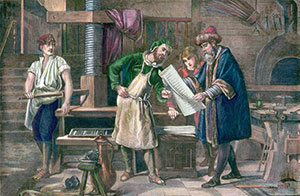Gutenberg Movable Type System Named an ASME Landmark
Gutenberg Movable Type System Named an ASME Landmark
ASME designated Johannes Gutenberg’s system of movable type as its latest Historic Mechanical Engineering Landmark — the 269th since the landmark program was established in 1971 — on Feb. 3.
Although movable type originated in China during the 11th century, Gutenberg’s innovative movable type system significantly reduced the time and cost of producing the printed word, resulting in the widespread availability of books and the advancement of literacy.
Introduced between 1540 and 1550, his system incorporated the necessary elements that would make printing with interchangeable type feasible: an oil-based, fast-drying ink; a durable easy-to-cast metal alloy for making type; a screw press designed for rapid operation; and, perhaps most importantly, an adjustable mold for the quick casting of metal type, which allowed alphabetic characters to be precisely and repeatedly replicated.
A precursor of the concept of mass-production, Gutenberg’s invention “dramatically lowered the cost of printing, thus contributing to the expansion of literacy and the more rapid exchange and more permanent preservation of ideas. These developments, in turn, facilitated the dissemination of ideas essential for the scientific and industrial revolutions,” according the landmark citation.
To learn more about the ASME History and Heritage Landmarks Program, visit www.asme.org/about-asme/engineering-history/landmarks/about-the-landmarks-program.




